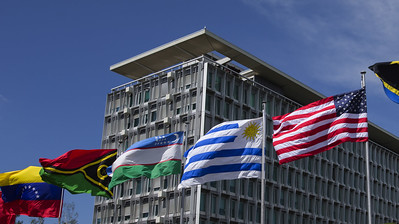 Image credit United States Mission Geneva / Flickr https://creativecommons.org/l
Image credit United States Mission Geneva / Flickr https://creativecommons.org/l
The U.S. and the World Health Organization
U.S. and the WHO
June 17th will mark the end of the thirty-day period President Trump has given the World Health Organization to change its stance on China. At that point, the U.S.’s future within the WHO will be determined based on a review of the organization’s actions during COVID-19 and whether the organization has made sufficient changes.
In mid-May President Trump sent a letter to the Director-General of the World Health Organization, criticizing the organization and informing the Director-General that the U.S. would be freezing its funding of the WHO budget. This suspension of funding is expected to last for 60-90 days. While the letter gave several criticisms, the objections mostly relate to the organization’s lenient treatment of China since the beginning of COVID-19. The letter claims that the WHO is unduly influenced by China and that this has caused the organization to fail in executing some of its key responsibilities.
International Health Regulations
The WHO was formed in 1948 as a specialized agency of the United Nations and consists of 194 member states. Each state sends representatives to the annual World Health Assembly (WHA), which determines the organization’s policies and objectives. The WHO exists mainly in an advisory role, with no power to impose health policies on the governments of its member states.
However, as of 2007, all the WHO member states agreed to abide by the International Health Regulations (IHR). These regulations require that governments seek to detect diseases and respond to public health risks. The IHR also gives the WHO certain responsibilities such as assessing, requesting information about, and investigating any novel or evolving risks to international public health.
In the context of COVID-19, the U.S. believes that China did not fulfill its obligations under the IHR because of attempts to mask the full extent of the early virus and withhold information. While the claims are focused on China, the U.S. holds the WHO responsible, mainly due to its role as investigator and risk assessor under the IHR. The U.S. claims that the WHO was too trusting of China and unwilling to criticize the country’s missteps in handling COVID-19.
Risks
Withdrawing U.S. membership in the WHO would cause more harm than good. One of the WHO’s greatest strengths is its ability to foster collaboration and research among medical experts. Leaving the organization as professionals around the world are seeking to develop a cure or vaccine for COVID-19 would strain relationships between researchers in the U.S. and those abroad, slow the sharing of information, and put the U.S. at a disadvantage.
By leaving the organization, the U.S. also risks losing influence and weakening its leadership role in the international community. The light in which the world views the U.S. after the pandemic subsides will depend largely on its actions at this moment. Additionally, if the U.S. were to pull back, China would be free to strengthen its influence on the WHO and international medical community.
European Union’s Resolution
Countering claims by the U.S., some argue that the WHO’s lack of power and consequent need for delicate diplomacy has created this apparent alignment with China. However, many other countries, while praising the WHO for its work throughout COVID-19, have also noted deficiencies. On May 19th a resolution proposed by the European Union was adopted in the WHO. Part of the resolution called for an impartial, independent, and comprehensive evaluation of:
- The effectiveness of the WHO’s mechanisms.
- How well the IHR functions.
- The WHO’s contribution to the United Nation’s efforts.
- The WHO’s handling of COVID-19.
The findings of this evaluation, which will be completed post-pandemic, could be vital for bringing fundamental changes to the WHO. Naturally, the benefit of an independent evaluation depends largely on how it is carried out and the level to which the WHO follows consequent recommendations.
Moving Forward
The WHO’s slow response and passive stance concerning China may have contributed to an inability to constrain the pandemic. However, leaving the organization will exacerbate the current situation, not remedy it. Bringing about meaningful change in an international organization is a daunting task; from the outside it will be nearly impossible.
Instead, the U.S. should continue to work with the organization and the international community through this global crisis. Continuing to build U.S. influence will increase the chance of improving the WHO. After the pandemic has passed, and the independent evaluation completed, the U.S. should again re-examine its relationship with the organization. However, for the time being, America should work with what it has.





